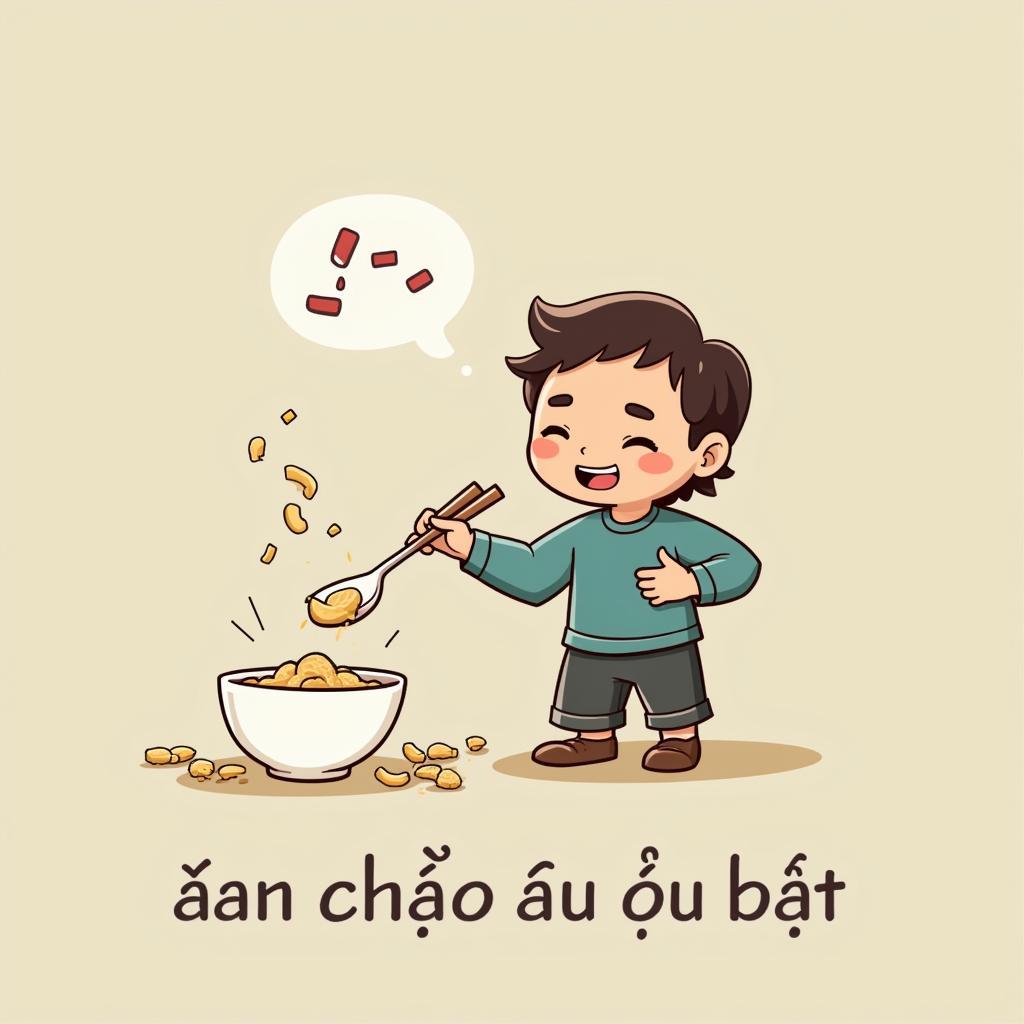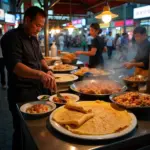The Vietnamese idiom “ăn cháo đá bát” translates literally to “eat the porridge and then throw away the bowl.” This saying, deeply ingrained in Vietnamese culture, describes the ungrateful act of benefiting from someone’s kindness and then turning against them or forgetting their generosity. It’s a concept that resonates deeply within Vietnamese society, highlighting the importance of gratitude and loyalty. We’ll explore the nuances of this idiom, examining its cultural significance and how it reflects Vietnamese values. After understanding the meaning, let’s explore Hanoi’s rich culture with TRAVELCAR’s convenient 16, 29, and 45-seater vehicles. Our services include airport transfers, guided tours, and pick-up/drop-off at tourist destinations.
The Cultural Significance of “Ăn Cháo Đá Bát”
“Ăn cháo đá bát” is more than just a saying; it’s a moral compass. In Vietnam, where community and reciprocal relationships are highly valued, this idiom serves as a reminder of the importance of remembering and reciprocating kindness. It’s used to condemn those who display ingratitude, disloyalty, or betrayal after receiving help or support. The saying emphasizes the expectation of loyalty and respect towards those who have extended a helping hand. It’s a potent tool for social commentary, used to criticize individuals or even organizations that have forgotten their benefactors.
If you’re feeling under the weather during your travels, check out our articles on what to eat when you’re sick: bị ốm sốt nên ăn gì.
 Person Throwing Bowl Away After Eating Porridge
Person Throwing Bowl Away After Eating Porridge
What does “Ăn Cháo Đá Bát” mean in practical terms?
“Ăn cháo đá bát” isn’t just about forgetting a small favor. It represents a deeper betrayal of trust and loyalty. It can refer to situations where someone receives significant support, perhaps financial or emotional, and then turns against their benefactor. This could manifest as speaking ill of them, actively harming them, or simply forgetting their contribution.
Examples of “Ăn Cháo Đá Bát”
This idiom can be applied to a variety of situations: an employee leaving a company after receiving extensive training and then joining a competitor, a student forgetting the teacher who mentored them, or even a country forgetting the allies who helped them in times of need.
For helpful tips on managing a sore throat, visit our page: đau rát cổ họng nên ăn gì.
Why is “Ăn Cháo Đá Bát” so important in Vietnamese culture?
Vietnamese culture places strong emphasis on reciprocal relationships and social harmony. “Ăn cháo đá bát” serves as a cultural mechanism to reinforce these values. It acts as a deterrent against ingratitude and encourages people to remember and appreciate the kindness shown to them. This idiom also underscores the importance of maintaining long-term relationships built on trust and mutual respect.
How to avoid being accused of “Ăn Cháo Đá Bát”
Showing gratitude and maintaining loyalty are key to avoiding being labeled as someone who “ăn cháo đá bát”. Expressing sincere thanks, remembering the help received, and reciprocating kindness when possible are essential. Building strong relationships based on trust and mutual respect will also help avoid this negative label.
Conclusion: Remembering Kindness and Loyalty
Understanding the idiom “ăn cháo đá bát” provides valuable insight into Vietnamese culture. It highlights the profound importance of gratitude, loyalty, and reciprocal relationships. By remembering the kindness of others and reciprocating their generosity, we can strengthen our bonds and contribute to a more harmonious society. Remember TRAVELCAR for your transportation needs in Hanoi, from airport transfers to exploring historical sites. Contact us at 0372960696, [email protected], or visit us at 260 Cầu Giấy, Hanoi.
FAQ
- What does “ăn cháo đá bát” literally translate to?
- What are some examples of “ăn cháo đá bát” in real-life situations?
- Why is this idiom so significant in Vietnamese culture?
- How can I avoid being accused of “ăn cháo đá bát”?
- What are some other Vietnamese idioms related to gratitude and loyalty?
- How does “ăn cháo đá bát” reflect Vietnamese societal values?
- What are the consequences of being labeled as someone who practices “ăn cháo đá bát”?
If you’re experiencing stomach discomfort, read our article on what to eat: ăn gì khi đau dạ dày. Also, check out our advice on what to eat when you have a fever: bị sốt nên ăn gì uống gì. For information on dietary recommendations during infections, see: bị nhiễm trùng nên ăn gì.
Need assistance with your travel plans in Hanoi? Contact TRAVELCAR at 0372960696, TRAVELCAR[email protected], or visit our office at 260 Cầu Giấy, Hanoi. Our 24/7 customer service team is ready to assist you.

